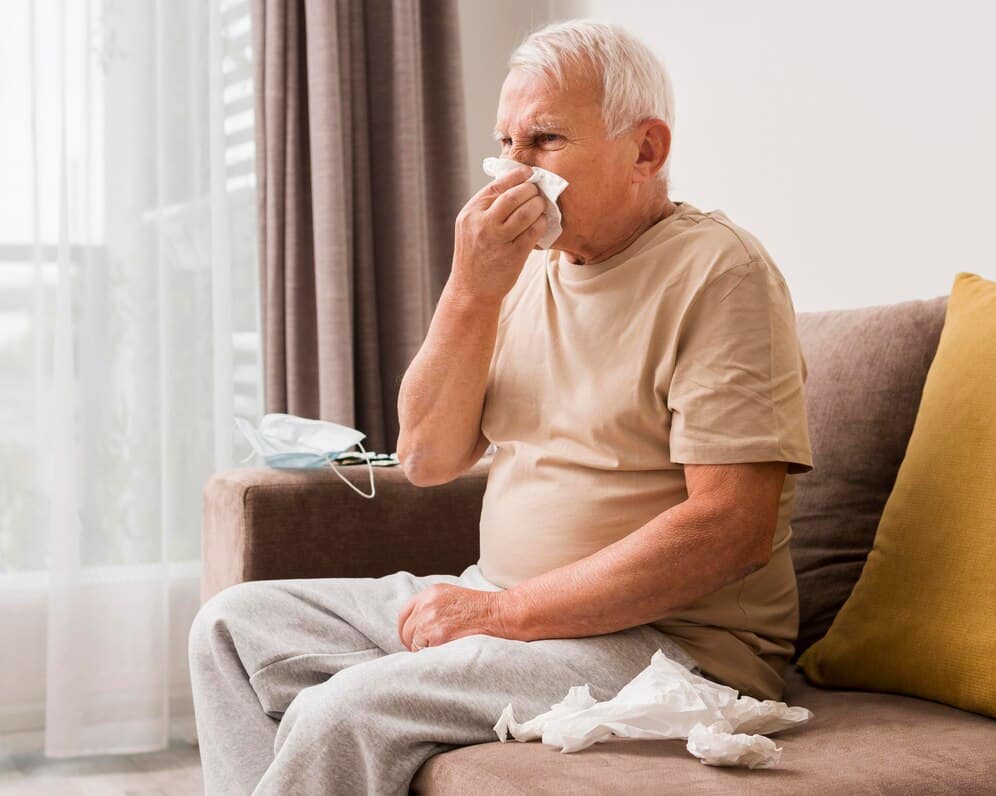Our bodies undergo various changes as we age, and our respiratory system is no exception. Seniors often face unique challenges regarding respiratory health, making it crucial to understand the intricacies of respiratory diseases in this demographic. This comprehensive guide from Westmont of Brentwood will delve into the common respiratory ailments affecting seniors, explore their causes, symptoms, and management strategies, and provide essential tips for maintaining optimal respiratory health in the golden years.
Common Respiratory Diseases in Seniors
Seniors are particularly susceptible to a range of respiratory diseases, including chronic obstructive pulmonary disease (COPD), pneumonia, asthma, and respiratory infections such as influenza and COVID-19. COPD, characterized by progressive airflow obstruction, is prevalent among seniors, often stemming from years of smoking or exposure to environmental pollutants. Pneumonia, a potentially life-threatening infection of the lungs, is another significant concern, especially in older adults with weakened immune systems. Asthma, though commonly associated with childhood, can persist into adulthood and exacerbate with age, leading to respiratory distress in seniors.
Causes and Risk Factors
Understanding the underlying causes and risk factors of respiratory diseases in seniors is paramount in prevention and management. Smoking remains one of the leading causes of respiratory ailments, including COPD and lung cancer, emphasizing the importance of smoking cessation initiatives for seniors. Additionally, exposure to environmental pollutants, such as secondhand smoke, dust, and air pollution, can contribute to respiratory issues. Aging is a risk factor, as natural changes in lung function and immune response make seniors more vulnerable to respiratory infections and diseases.
Symptoms and Warning Signs
Recognizing the symptoms and warning signs of respiratory diseases in seniors is crucial for early intervention and treatment. Common symptoms include shortness of breath, coughing, wheezing, chest tightness, fatigue, and respiratory infections accompanied by fever and chills. Seniors experiencing these symptoms should seek prompt medical attention to prevent complications and ensure proper management of their respiratory condition.

Symptoms and Warning Signs
Diagnosis and Management Strategies
Diagnosing respiratory diseases in seniors often involves a combination of medical history assessment, physical examinations, pulmonary function tests, imaging studies, and laboratory tests. Once diagnosed, management strategies may include medication therapy, pulmonary rehabilitation, supplemental oxygen therapy, lifestyle modifications, and vaccination against respiratory infections. Seniors must work closely with healthcare providers to develop personalized treatment plans tailored to their needs and medical history.
Preventive Measures
Prevention plays a crucial role in maintaining respiratory health in seniors. Encouraging lifestyle modifications such as smoking cessation, regular exercise, maintaining a healthy weight, and avoiding exposure to environmental pollutants can significantly reduce the risk of respiratory diseases. Annual flu and pneumococcal vaccines are recommended for seniors to prevent influenza and pneumonia. Additionally, practicing good hygiene, such as frequent handwashing and avoiding close contact with sick individuals, can help prevent the spread of respiratory infections.
Nutrition and Respiratory Health
Proper nutrition plays a vital role in supporting respiratory health in seniors. A balanced diet rich in fruits, vegetables, lean proteins, whole grains, and healthy fats provides essential nutrients that support immune function and lung health. Foods high in antioxidants, such as vitamins C and E, can help reduce inflammation and protect against respiratory infections. Seniors should also stay adequately hydrated to maintain optimal respiratory function.
Exercise and Respiratory Health
Regular exercise benefits seniors’ respiratory health, as it helps improve lung function, strengthen respiratory muscles, and enhance overall cardiovascular fitness. Low-impact activities such as walking, swimming, and gentle yoga can be particularly beneficial for seniors with respiratory conditions, as they improve oxygen circulation without placing undue stress on the body. Regular physical activity also helps maintain a healthy weight. It reduces the risk of obesity, a significant risk factor for respiratory diseases.
Stress Management and Respiratory Health
Chronic stress can negatively impact respiratory health by triggering inflammation, compromising immune function, and exacerbating respiratory symptoms. Seniors can benefit from stress-reduction techniques such as deep breathing exercises, meditation, mindfulness, and relaxation therapies. These techniques promote relaxation but also help improve lung function and alleviate respiratory symptoms associated with stress and anxiety.
Environmental Considerations
Creating a respiratory-friendly environment is essential for seniors’ well-being, particularly those with respiratory conditions. Seniors should avoid exposure to indoor pollutants such as tobacco smoke, mold, dust mites, and pet dander, which can exacerbate respiratory symptoms. Ensuring proper ventilation, using air purifiers, and maintaining a clean living space can help minimize indoor air pollution and promote respiratory health. Additionally, seniors should be cautious of outdoor air quality, especially during high pollution days or wildfire seasons, and limit outdoor activities accordingly.
Social Support and Respiratory Health
Maintaining strong social connections is crucial for seniors’ respiratory health, as social isolation and loneliness can contribute to stress and depression and worsen respiratory symptoms. Seniors should prioritize staying connected with family, friends, and community groups to foster emotional support, reduce stress, and promote overall well-being. Engaging in social activities, hobbies, and group outings can also provide a sense of purpose and belonging, essential for maintaining respiratory health and quality of life.
Join our community
In conclusion, understanding respiratory diseases in seniors is paramount for promoting optimal health and well-being in this demographic. By recognizing common respiratory ailments, understanding their causes and risk factors, and implementing preventive measures, seniors can take proactive steps to maintain respiratory health and enhance their overall quality of life. From lifestyle modifications and stress management techniques to environmental considerations and social support, there are numerous strategies seniors can employ to safeguard their respiratory health as they age.
Contact us
If you or a loved one are experiencing respiratory symptoms or concerns about respiratory health, don’t hesitate to contact Westmont of Brentwood for assistance and support. Our team of healthcare professionals is dedicated to helping seniors maintain optimal respiratory health and overall well-being. Call us at 925-516-8006 to learn more about our services and how we can assist you. Your respiratory health matters, and we’re here to help every step of the way.








